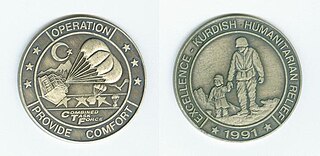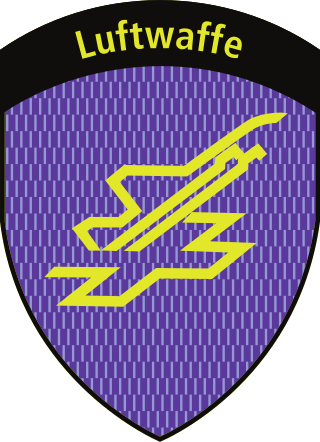Related Research Articles

The Northrop F-5 is a family of supersonic light fighter aircraft initially designed as a privately funded project in the late 1950s by Northrop Corporation. There are two main models, the original F-5A and F-5B Freedom Fighter variants and the extensively updated F-5E and F-5F Tiger II variants. The design team wrapped a small, highly aerodynamic fighter around two compact and high-thrust General Electric J85 engines, focusing on performance and a low cost of maintenance. Smaller and simpler than contemporaries such as the McDonnell Douglas F-4 Phantom II, the F-5 cost less to procure and operate, making it a popular export aircraft. Though primarily designed for a day air superiority role, the aircraft is also a capable ground-attack platform. The F-5A entered service in the early 1960s. During the Cold War, over 800 were produced through 1972 for US allies. Though at the time the United States Air Force (USAF) did not have a need for a light fighter, it did procure approximately 1,200 Northrop T-38 Talon trainer aircraft, which was based on Northrop's N-156 fighter design.

The McDonnell Douglas F/A-18 Hornet is an all-weather, twin-engine, carrier-capable, multirole combat aircraft, designed as both a fighter and attack aircraft. Designed by McDonnell Douglas and Northrop, the F/A-18 was derived from the latter's YF-17 in the 1970s for use by the United States Navy and Marine Corps. The Hornet is also used by the air forces of several other nations, and formerly by the U.S. Navy's Flight Demonstration Squadron, the Blue Angels.

Operation Provide Comfort and Provide Comfort II were military operations initiated by the United States and other Coalition nations of the Persian Gulf War, starting in April 1991, to defend Kurdish refugees fleeing their homes in northern Iraq in the aftermath of the Gulf War, and to deliver humanitarian aid to them. The no-fly zone instituted to help bring this about would become one of the main factors allowing the development of the autonomous Kurdistan Region.

The Northrop P-61 Black Widow is a twin-engine United States Army Air Forces fighter aircraft of World War II. It was the first operational U.S. warplane designed as a night fighter.

The Swiss Air Force is the air component of the Swiss Armed Forces, established on 31 July 1914, three days after the outbreak of World War I, as a part of the army and in October 1936 as an independent service.

The German Air Force is the aerial warfare branch of the Bundeswehr, the armed forces of Germany. The German Air Force was founded in 1956 during the era of the Cold War as the aerial warfare branch of the armed forces of then West Germany. After the reunification of West and East Germany in 1990, it integrated parts of the air force of the former German Democratic Republic, which itself had been founded in 1956 as part of the National People's Army. There is no organizational continuity between the current German Air Force and the former Luftwaffe of the Wehrmacht founded in 1935, which was completely disbanded in 1945/46 after World War II. The term Luftwaffe that is used for both the historic and the current German air force is the German-language generic designation of any air force.

The Patrouille Suisse is an aerobatic team of the Swiss Air Force. The team flies six Northrop F-5E Tiger II fighter/bomber jets.

Switzerland competed at the 1988 Summer Olympics in Seoul, South Korea. 99 competitors, 72 men and 27 women, took part in 83 events in 17 sports.
Oberst is a senior field officer rank in several German-speaking and Scandinavian countries, equivalent to Colonel. It is currently used by both the ground and air forces of Austria, Germany, Switzerland, Denmark, and Norway. The Swedish rank överste is a direct translation, as are the Finnish rank eversti and the Icelandic rank ofursti.

438 "City of Montreal" Tactical Helicopter Squadron is a unit of the Royal Canadian Air Force. The squadron operates the CH-146 Griffon tactical helicopter from the Hartland de Montarville Molson Hangar of CFB St. Hubert in Quebec, Canada. Its tasks include armed and unarmed tactical utility transport, training aircrew personnel in basic and advanced aviation tactics, technical training of groundcrew personnel and flight engineers and the periodic maintenance of CH-146 fleet aircraft. They also include as residual capabilities search and rescue, reconnaissance and support to federal, provincial and local law enforcement agencies. A "total force" unit composed of members of the Regular Force, and both full time and part time reservists, the squadron is part of 1 Wing at CFB Kingston Ontario.
Lieutenant-General Carlo Gagiano was a South African military commander and former Chief of the South African Air Force. He joined the South African Air Force in 1968, and served in the Border War in South West Africa in the 1980s.

Yves Rossy is a Swiss military-trained pilot and an aviation enthusiast. He is known as the inventor of a series of experimental individual jet packs, the latest using carbon-fiber wings for flight. Often referred to as "Jetman", Rossy has sometimes tested and presented new versions of his jetpacks in high-profile events staged around the world.
The United States Air Force became a separate military service on 18 September 1947 with the implementation of the National Security Act of 1947. The Act created the National Military Establishment, later renamed the United States Department of Defense, which was composed of four of the five branches, the Army, Marine Corps, Navy, and a newly created Air Force. Prior to 1947, the responsibility for military aviation was divided between the Army for land-based operations and the Navy and Marine Corps for sea-based operations from aircraft carrier and amphibious aircraft. The Army created the first antecedent of the Air Force on 1 August 1907, which through a succession of changes of organization, titles, and missions advanced toward eventual separation 40 years later. The predecessor organizations leading up to today's U.S. Air Force are:

The 425th Fighter Squadron is part of the 56th Operations Group at Luke Air Force Base, Arizona. It operates the General Dynamics F-16 Fighting Falcon aircraft conducting advanced fighter training for Republic of Singapore Air Force F-16 pilots.
Hispanics in the United States Air Force can trace their tradition of service back to the United States Army Air Forces (USAAF), the military aviation arm of the United States Army during and immediately after World War II. The USAAF was the predecessor of the United States Air Force, which was formed as a separate branch of the military on September 18, 1947, under the National Security Act of 1947. In the U.S., the term Hispanic categorizes any citizen or resident of the United States, of any racial background, of any country, and of any religion, who has at least one ancestor from the people of Spain or is of non-Hispanic origin but has an ancestor from Mexico, Puerto Rico, Cuba, Central or South America, or some other Hispanic origin. The three largest Hispanic groups in the United States are the Mexican-Americans, Puerto Ricans, and Cubans. According to the U.S. Census Bureau the estimated Hispanic population of the United States is over 50 million, or 16% of the U.S. population, and Hispanics are the nation's largest ethnic minority. The 2010 U.S. census estimate of over 50 million Hispanics in the U.S. does not include the 3.9 million residents of Puerto Rico, thereby making the people of Hispanic origin the nation's largest ethnic or race minority as of July 1, 2005.
Divisional general Claude Meier is a Swiss professional officer of the Swiss Armed Forces.
Daniel «Dani» Hösli is a former Swiss Air Force pilot. He was a professional officer who gained the rank of lieutenant colonel.
Fliegerstaffel 11 (Tigers) of the Swiss Air Force is a Berufsfliegerkorps squadron equipped with F/A-18 combat jets and, together with Fliegerstaffel 8, is part of Fliegergeschwader 13. The home base of Fliegerstaffel 11 is Meiringen Air Base. Fliegerstaffel 11 is a full member of the NATO Tiger Association and carries a coat of arms depicting a Tiger head on a black background and the wordmark Staffel 11 below the tiger head as its crest.

Fighter Squadron 2/30 Normandie-Niemen is a French Air and Space Force fighter squadron which flies the Dassault Rafale C from BA 118 Mont-de-Marsan Air Base. During a dormant period in 2009, the squadron was equipped with Dassault Mirage F1CT fighters and stationed at the BA 132 Colmar-Meyenheim Air Base.

Ingo Gerhartz is a German Air Force lieutenant general. He has been serving as the Inspector of the Air Force since 2018.
References
- ↑ Jahrespublikation der Schweizer Luftwaffe 2018 ISBN 978-3-9524427-4-6 "Pierre-Yves Eberlé, ab 2018 neuer Chef des AOC on Page 42
- ↑ Stabante 11
- ↑ Operationszentrale Luftwaffe Eberle Pierre-Yves
- ↑ Evans, Hilary; Gjerde, Arild; Heijmans, Jeroen; Mallon, Bill; et al. "Pierre-Yves Eberle Olympic Results". Olympics at Sports-Reference.com. Sports Reference LLC. Archived from the original on 4 December 2016. Retrieved 24 March 2017.
- ↑ Operationszentrale Luftwaffe Eberle Pierre-Yves